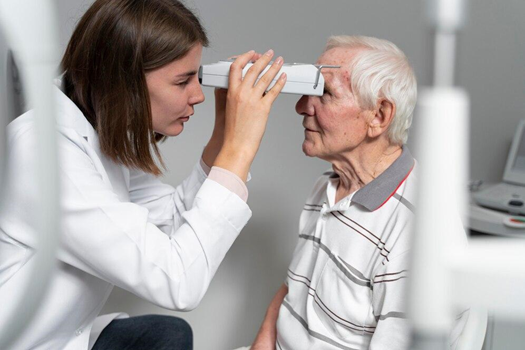
Understanding Urgent Care For Vision Loss
Urgent care for vision loss plays a vital role in preserving sight and preventing long-term complications. Sudden vision changes, severe eye pain, or trauma require immediate medical attention, as delays can lead to permanent damage. Urgent care services operate beyond regular office hours, ensuring rapid diagnosis and treatment when time is critical. These services address emergencies such as retinal detachment, acute glaucoma, eye infections, and injuries. By recognizing the signs of vision-threatening conditions and knowing where to seek prompt care, individuals can protect their eyesight and overall well-being.
Common Causes Of Vision Loss Requiring Urgent Care
Urgent eye conditions such as retinal detachment, acute glaucoma, and severe infections like endophthalmitis require immediate medical intervention to prevent permanent vision loss. Retinal detachment presents with sudden floaters, flashes of light, or a dark shadow in the visual field. Acute glaucoma causes rapid intraocular pressure, leading to severe pain, redness, nausea, and vision decline. Endophthalmitis, often occurring after surgery or trauma, manifests as intense pain, redness, and vision loss. Prompt treatment is crucial in all these cases to preserve vision and prevent irreversible damage.
The Role Of Eye Doctors In Critical Situations
Eye doctors play a vital role in managing urgent vision loss by swiftly diagnosing and treating eye conditions. Using advanced tools like optical coherence tomography (OCT) and fundus photography, they assess internal eye structures for precise diagnoses. Their expertise extends beyond treatment, providing patients with reassurance and guidance during distressing situations. Depending on the condition, treatment plans may include medications, surgical procedures, or specialized therapies aimed at restoring vision. Their prompt and effective interventions highlight the critical importance of seeking immediate eye care when sudden vision changes occur.
Signs You Need Immediate Eye Care
Recognizing the signs that necessitate immediate eye care can be lifesaving. Sudden vision changes, such as blurriness, dark spots, or tunnel vision, should never be ignored. These symptoms may indicate underlying conditions that require urgent attention.
Experiencing flashes of light or an increase in floaters can be indicative of retinal detachment. Similarly, severe eye pain, redness, and nausea could signal acute glaucoma. Both conditions are emergencies that demand immediate evaluation by an eye doctor.
Additional signs include double vision, sudden loss of peripheral vision, or a noticeable change in the color of vision. Recognizing these symptoms and seeking prompt medical attention is crucial to preserving sight and preventing long-term damage.
How Eye Doctors Diagnose Vision Loss Urgently
In urgent cases, eye doctors follow a structured diagnostic process to determine the cause of vision loss. It begins with a detailed patient history to assess symptom onset and progression, followed by a comprehensive eye exam to detect abnormalities. Advanced tests such as visual field assessments, slit-lamp examinations, and retinal imaging provide critical insights. In some instances, blood tests or imaging studies like MRI or CT scans may be required to rule out underlying systemic conditions. This meticulous approach ensures accurate diagnosis and timely intervention to preserve vision.
Treatment Options For Acute Vision Loss
Treating acute vision loss involves a multifaceted approach tailored to the underlying cause. For retinal detachment, surgery such as vitrectomy or laser therapy might be necessary to reattach the retina. Prompt intervention is vital to restore vision.
Acute glaucoma treatment often begins with medications to lower intraocular pressure. In severe cases, laser treatment or surgery might be required to alleviate pressure and prevent further optic nerve damage. The goal is to halt disease progression and preserve sight.
Infections like endophthalmitis require immediate antibiotic or antifungal treatment, often administered directly into the eye. Swift action in these cases can prevent further vision loss and protect the eye from significant damage. The diversity of treatment options underscores the importance of personalized care in urgent situations.
Preventive Measures To Avoid Vision Loss
Preventing vision loss requires a proactive approach that includes regular eye exams, protective measures, and a healthy lifestyle. Routine check-ups allow for early detection of conditions like glaucoma and macular degeneration, reducing the likelihood of emergencies. Protective eyewear is essential for preventing injuries during sports or hazardous activities. Managing chronic conditions such as diabetes and hypertension is equally important, as they can negatively affect eye health. Additionally, a nutrient-rich diet with omega-3 fatty acids, lutein, and zeaxanthin supports long-term vision health, helping to prevent degenerative eye conditions.
When To Seek Emergency Eye Care
Recognizing when to seek emergency eye care is key to preserving vision and preventing irreversible damage. Sudden vision loss, severe eye pain, flashes of light, or an increase in floaters should never be ignored. Eye injuries, such as chemical exposure or foreign objects, also demand immediate attention. Additionally, visual disturbances after head trauma may indicate serious underlying issues. When in doubt, it’s always best to seek professional care—early intervention can make all the difference in protecting long-term eye health.
The Importance Of Regular Eye Exams
Regular eye exams are a fundamental aspect of preventive eye care, helping to detect and manage vision-threatening conditions before they worsen. These exams can identify early signs of glaucoma, macular degeneration, and other eye diseases, allowing for timely intervention. Additionally, routine check-ups ensure prescriptions for glasses or contact lenses remain accurate, optimizing vision. They also provide a valuable opportunity to discuss any concerns, reinforcing a proactive and comprehensive approach to maintaining long-term eye health.
Conclusion: Proactive Eye Care To Preserve Your Vision
In conclusion, urgent care for vision loss is an essential service that ensures timely intervention during critical situations. Eye doctors play a pivotal role in diagnosing and treating acute vision impairments, employing a range of tools and techniques to preserve sight.
Understanding the signs that necessitate urgent care and seeking timely assistance can prevent irreversible damage. While treatment options are available for acute conditions, preventive measures remain the best strategy for maintaining eye health.




